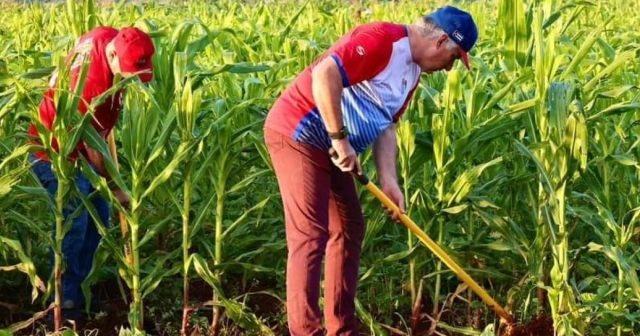The company Richmeat de Cuba S.A., dedicated to the production and distribution of meat products such as minced meat, once again obtained the distinction of “National Vanguard” for the third consecutive year.
Despite the serious crisis in the country's food industry sector and the risk of "food insecurity" that extends among broad layers of the population, the union authorities of the Cuban regime considered that the meat processing plant deserved the status of National Vanguard Collective for “the efficiency and quality of its production.”
With the presence of Jorge Luis Fajardo Casas, general secretary of the National Union of Food Industry and Fishing Workers, one hundred Richmeat workers from Cuba attended the event held in the Mariel Special Development Zone (ZED) to receive the distinction. The new Minister of the Food Industry, Alberto López Díaz, did not attend the event.
The company was the first to establish itself in the ZED Mariel as a result of a foreign investment project (Mexico). In 2015 it obtained approval from the Cuban authorities and it was inaugurated on January 24, 2020, with the presence of Cuban government officials, businessmen, media, representation of the Ministry of Foreign Affairs and personnel from the Mexican embassy.
In March 2023, Richmeat de Cuba S.A. produced a volume of about 3,000 metric tons of minced meat per month. Currently, more than 2,000 metric tons of minced meat leave the meat processing plant monthly.
This is how he explained it before the cameras of the Cuban Television News (NTV) the general secretary of the company's union section, Yipsian Roman Rodriguez, stating that It was a source of pride “to have [this picadillo] on the tables of all Cubans today.”.
The statement is still striking in the midst of a situation of widespread food shortages, in which the minced meat constitutes one of the products least consumed by Cubans, either because of its rare appearance at points of sale or because of its high prices in stores in freely convertible currency (MLC).
In December 2022, the Cuban regime implemented a system for the sale in national currency of released products of high demand that were sold in chain stores CIMEX and the Caribbean, given the failure of the state control modality known as “anti-coleros brigades”, in charge of organizing the queues in these establishments and preventing hoarding and other irregularities.
To do this, they defined five controlled lines (chicken, minced meat, sausage, oil and detergent), whose sale would be made in a certain period, in the store assigned according to the customer's area of residence, and the purchase would be noted in the supply book.
This sales modality began in five municipalities: Centro Habana, La Habana Vieja, Regla, Cotorro and Arroyo Naranjo, with the intention of extending it to the rest of the country. As of today, it is unknown if the residents of all the municipalities of Cuba have the possibility of accessing this modality of distribution of food and basic necessities.
The third distinction from Vanguardia Nacional to Richmeat de Cuba S.A. It occurs at a time when the news in Cuba was shaken by the revelation of a disgusting and scandalous case of animal abuse, and sale of meat not suitable for human consumption.
Last Thursday it emerged that three men had been arrested in San José de las Lajas, in the province of Mayabeque, for allegedly killing dogs from that municipality and then selling them as pork or mutton, and as mincemeat, as reported on Facebook. Yenny Caballero Peña, animal rights defender.
Days before, the Cuban authorities had denied information that was circulating on the internet about the alleged illegal production of mincemeat from dog and cat meat. According to the Government of Havana, the news “he was only trying to foment panic and discredit the authorities”.
Given the evidence provided by Caballero Peña, the Ministry of Agriculture issued an informative note repudiating the “dog killings in that territory", describing them as "attacking all Animal Health and Welfare regulations, which violate the ethical and moral principles of our society."
There are many Cubans who, because of their low salaries, are deprived of the possibility of purchasing meat products. Richmeat's seasoned mixed hash is sold at a price which ranges between 2.60 and 3.00 dollars for a 400 gram container. With the dollar trading at 350 CUP in the informal currency market, the minimum wage of Cuban workers (2,100 CUP) is reduced to about 6.00 dollars per month, at a time when A carton of 30 eggs costs 3,500 CUP, that is, about 10.00 dollars.
Surreptitiously, the Cuban regime has been implementing its policy of “eliminate excessive subsidies and undue gratuities”, ignoring the “social contract” that represented the supply book and the sale of rationed meat products at subsidized prices.
However, the union representative of Richmeat of Cuba did not blush when she stated with “pride” that The mixed seasoned picadillo is a product present “today on the tables of all Cubans”. Yipsian Román Rodríguez does not seem like one of those "paintings" who get startled If they find a frog in their package of hash.
The company that the Cuban ruler inaugurated in his day Miguel Diaz-Canel with his wife, Lis Cuesta Peraza, is part of the business fabric that plots “continuity” on the Island, based on the promotion of a “market economy” controlled by a totalitarian State that imposes his usual propagandist rhetoric, and proclaims the need to “enhance the socialist enterprise” while privatizing the country's economic assets in an opaque manner, advised by Russian experts in the creation of oligarchies submissive to mafia power.
What do you think?
COMMENTFiled in:
